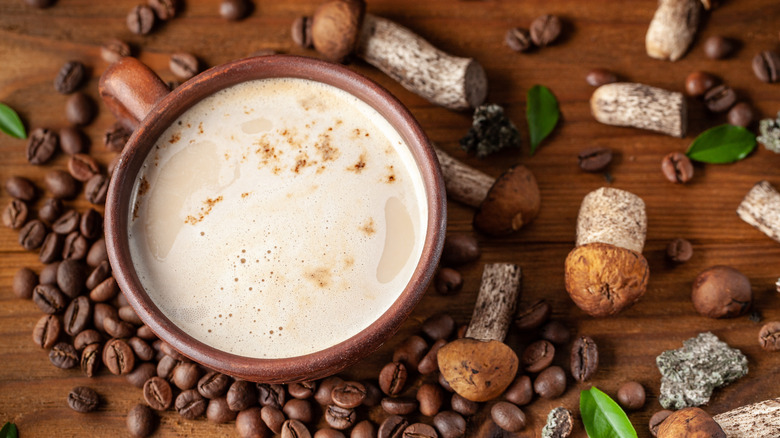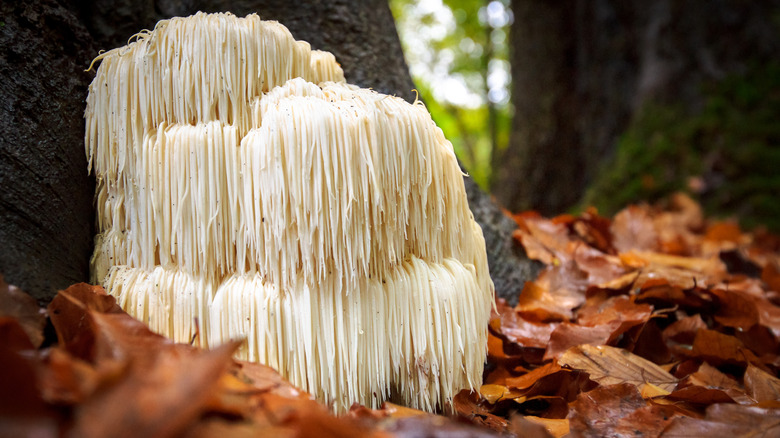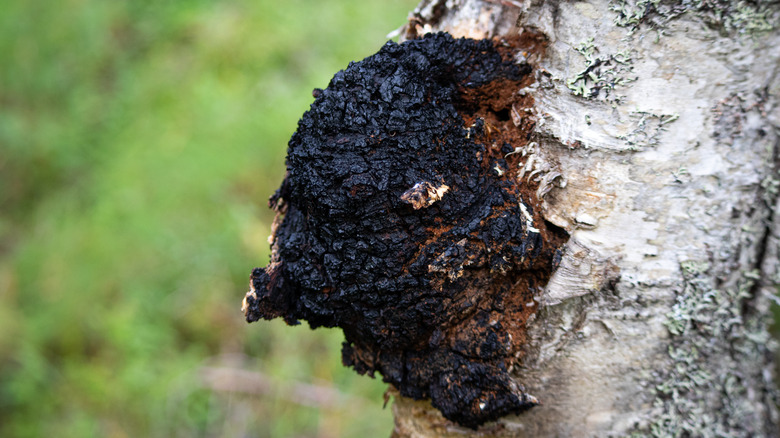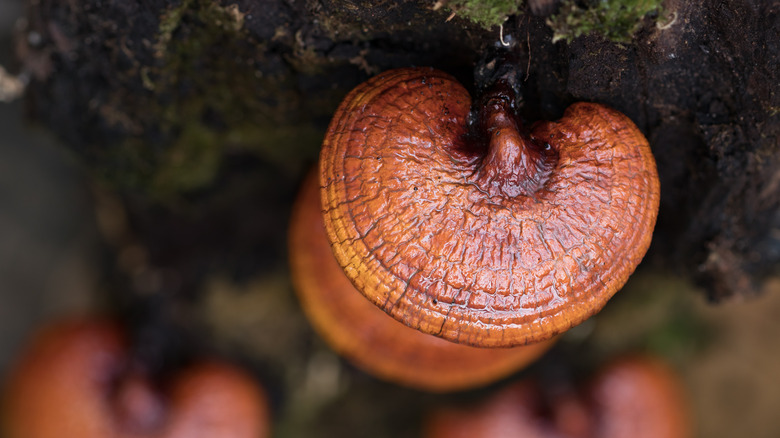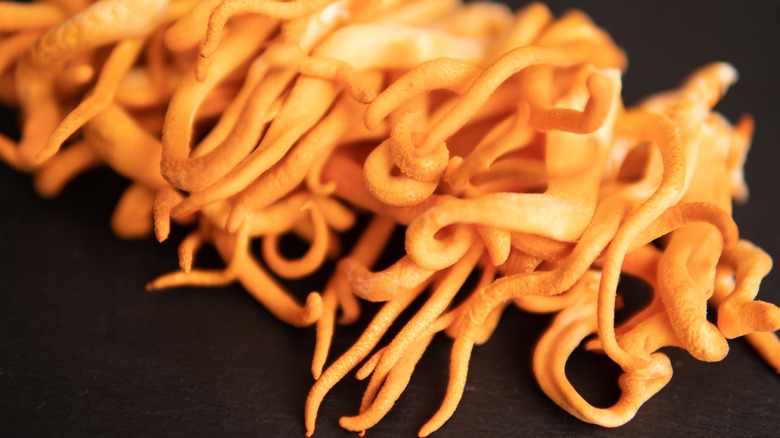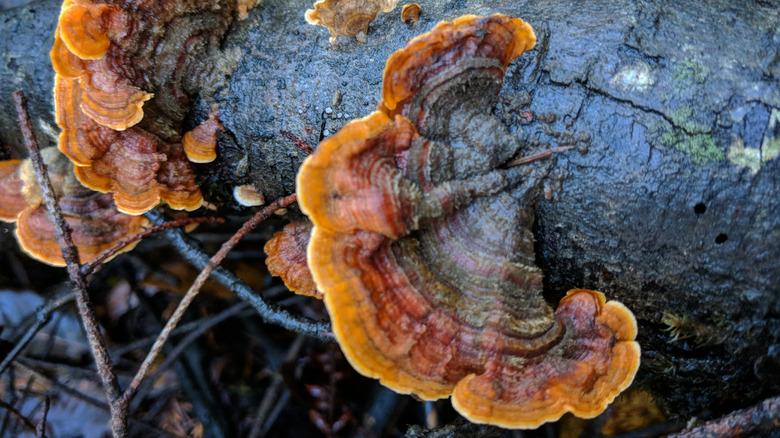The Types Of Mushrooms Commonly Used In Mushroom Coffee
Mushroom coffee has piqued the interest of java lovers who've found themselves overstimulated by their favorite morning beverage and those who are curious about the purported benefits of various fungi. According to Healthline, mushroom coffee is a mixture of ground mushrooms combined with coffee beans that brews into an earthy, nutty cup of coffee containing adaptogens, which are known to reduce stress levels and provide nutrients that might protect against certain diseases.
Mushrooms are making their way into everything from our morning coffee to our late-night ice cream, but despite the barrage of social media ads and images staking a claim on the current mushroom coffee trend, Food 52 states that fungi has been used as a coffee substitute as recently as the 1940s. When World War II caused shortages of pantry staples in Finland, people began brewing chaga mushrooms as a coffee alternative because of the variety's dark black color and earthy flavor.
Today's mushroom coffee blends go above and beyond color similarity and charge forward into medicinal blends that might provide a multitude of health benefits in addition to a complex flavor profile. Today's fungi-based alternatives mainly include lion's mane, chaga, reishi, cordyceps, and turkey's tail mushroom varietals; each with their own signature taste and health benefits. While a mushroom-based beverage might not sound like your cup of joe, learning about the possible health benefits and unique flavor profiles of fungi found in this trendy drink might just make it your go-to cup of coffee.
Lion's Mane
Folks who feel that they simply can't get going without their morning coffee might find a similar focus-inducing benefit from a nutrient-boosted mushroom coffee containing lion's mane. Much like the king of the jungle that its named for, this fungi is truly a sight to behold with its long, dangling white spines that grow in a shaggy fur-like clump off of hardwood trees (per Cascadia Mushrooms). Its notable and unique appearance is matched by its nutritional benefits.
Lion's mane is well known in traditional Chinese medicine for its benefits, chief among them being a mental boost. While much of the research into this medicinal mushroom is still in preliminary stages, Verywell Mind states that a few small studies showed significant improvement in cognitive and memory function, suggesting that compounds in lion's mane might reduce brain plaque associated with Alzheimer's disease and dementia.
Although lion's mane is popular for its ability to support the nervous system and increase mental clarity, its also well-liked for many other benefits. As a source of vitamin D in the produce section, mushrooms boast the immune-boosting and bone-strengthening vitamin associated with decreasing anxiety and depression symptoms (per the journal, Biomedical Research). Lion's mane is also high in beta-glucan, a fiber that WebMD states may increase longevity for cancer patients and might lower cholesterol levels. If you're interested in all of these nourishing benefits, the delicate lion's mane mushroom could be a welcome addition to your daily cup.
Chaga
Another fungus commonly used in mushroom coffee is the chaga varietal. Healthline describes it as a nutrient-packed fungus that may use a glow-up. This chunky shroom predominately grows on the bark of birch trees and has a dark skin likened to a lump of charcoal. Despite the unattractive appearance of the chaga mushroom, it's packed with nutrients and has a flavor profile that complements coffee alternatives.
Hailing from the cold climates of Siberia and Northern Europe, chaga mushrooms have been used medicinally for centuries to improve immunity and overall health (per Pharmaceutical Chemistry Journal). Studies have shown that they may protect against arthritis and other diseases by reducing inflammation within the body. Chaga mushrooms also increase white blood cell production, creating an immune response that helps the body fight harmful bacteria and viral infections (per Healthline). According to Eat This, Not That!, chaga is a bountiful source of essential vitamins, minerals, and a hefty dose of antioxidants that protect cells from oxidative stress.
In the food world, an unappealing appearance doesn't necessarily correlate to flavor or nutritional content, as is the case with chaga mushrooms. The Whistling Kettle describes this mushroom as having an earthy flavor with slightly bitter undertones, similar to coffee's profile. It also has naturally occurring vanillin, just like vanilla beans, that makes its unique flavor a bit more approachable. The complex flavor, deep charcoal color, and nutritious composition of chaga makes it a welcome addition to any mushroom coffee blend.
Reishi
Known as the "mushroom of immortality" for its body-balancing and disease-fighting properties, the reishi mushroom is a functional fungus used in Chinese medicine since its ancient history (per Eat This, Not That!). It features an earthy, bitter flavor. Reishi mushrooms have large reddish-brown caps stemming from the trunks of deciduous trees but are rarely found growing in the wild. Instead, they are usually farmed.
This mushroom has many of the stress-relieving and health-protecting properties of its counterparts. Nutritionist Kate Allan told Eat This, Not That! that reishi is well-liked for its nutritional content and high antioxidant levels which protect cells, reduce inflammation, and dole out an all-natural energy boost. Reishi mushrooms are recognized for its immune-balancing compounds and cancer-fighting properties.
Adaptogens found in them help teach the body how to regulate biological responses to stress while also offering a boost to our immune systems when we are sick. According to Healthline, tentative studies show that reishi stimulates white blood cells and activates "natural killer cells" that fight illnesses and cancer. Research suggests that reishi might reduce the number and decrease the size of intestinal tumors caused by cancer. Another study showed that 59% of surveyed breast cancer survivors used reishi mushrooms as a medicinal supplement.
Despite their unappetizing flavor profile, reishi mushrooms are fully redeemed by their many health benefits. They taste best combined with other ingredients and release healthy compounds when steeped in a warm beverage, making them an essential component of a mushroom coffee blend.
Cordyceps
When you want to reap the many possible benefits of cordyceps mushrooms by incorporating them into your daily coffee ritual, it might best to blow right past how it grows. According to Scientific American, cordyceps is a highly beneficial fungus dubbed "Himalayan Gold" because it is harvested in the high mountain regions of China and has been used for centuries to treat ailments and increase stamina. You might be able to overlook the fact that it grows out of the brains of insects and spiders once you learn about the multitude of health benefits offered by this superfood fungus.
Of its 400 species, cordyceps sinensis and cordyceps militaris varietals are most widely used for their active medicinal compounds. According to Healthline, cordyceps may promote adenosine triphosphate (ATP) production that improves oxygen use and provides a boost of energy to muscles that can increase stamina and improve exercise performance.
Cordyceps are also full of antioxidants which may help fatigue, boost sex drive, reduce inflammation, and stave off symptoms of the aging process. In addition to possibly improving heart health and controlling blood sugar, cordyceps might inhibit the growth of cancerous tumors and increase white blood cell production in patients receiving cancer treatments. It also might protect against kidney disease (per Healthline).
Modern day medicinal cordyceps are often grown in labs to avoid the tedious and expensive natural insect harvest method (via Healthline). That, coupled with its nutritional profile, makes cordyceps a more approachable and multifunctional addition to your mushroom coffee.
Turkey's Tail
People who find it challenging to fulfill their daily dose of veggies might benefit from the medicinal and nutritional benefits of turkey's tail mushroom. Named after its colorful fruiting body that fans out to look like the tail of Thanksgiving's favored fowl, this fungus is one of the most well-known and widely researched medicinal mushrooms (via Real Mushrooms). The list of health benefits from the compounds in turkey's tail are as varied as the colors it displays.
According to Healthline, turkey's tail contain carbohydrates called polysaccharopeptides that have potent immune-boosting properties. These compounds can improve immune system functions and have yielded promising results in studies of their benefits in cancer treatments. The polysaccharides found in turkey's tail can also act as a prebiotic that feeds healthy bacteria in our intestines, improving digestion and supporting many beneficial bodily functions linked to a healthy gut.
Powerful antioxidants are abundant within turkey's tail mushroom and reduce the amount of damage done to our cells by free radicals. This fungus' antioxidants and healthful compounds may also reduce inflammation and support liver function.
More research and studies are needed to confirm the purported health benefits of the functional fungi commonly found in mushroom coffee blends, especially in western medicine. The stress-reducing adaptogen compounds and impressive nutritional content of these mushrooms are worth considering when brewing your next morning beverage.
